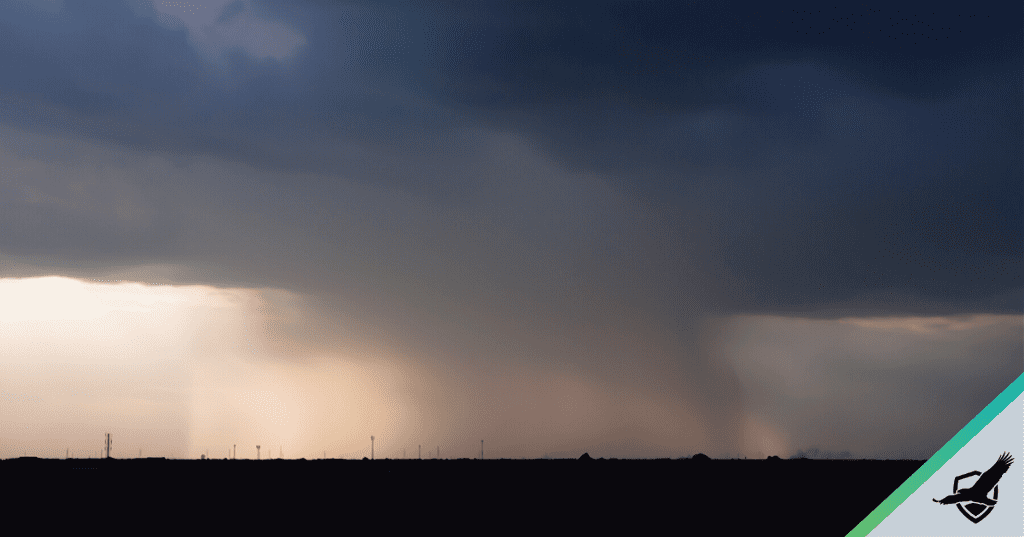Staying Safe Through Tornado Season: A Visual Guide

A thin funnel stretches down from the dark sky. The swirling whirlwind touches the ground and charges ahead.
Spring brings sunny days and chirping birds. But it’s the start of tornado season, which peaks in April and lasts through June.
Prepare now to stay safe before, during, and after a tornado.
Before the Tornado
Tornado Watch
A tornado watch means the current conditions could lead to a tornado in your area. Move your disaster kit into your shelter room or basement if you don’t store it there.
Talk to your wireless carrier about Wireless Emergency Alerts (WEA). With these alerts active on your phone, you’ll get a notification when a serious storm is in the area.
Disaster Kit
Ready.gov says you should keep these items in a disaster kit:
BatteriesBlanketsCan openerClosed-toed shoesDust masksFirst aid kitFlashlightImportant papers (Social Security cards, birth certificates, insurance information)MedicationsPet supplies (food, leashes, carriers)Phone, computer, and chargersPortable weather radioA three-day supply of foodA three-day supply of water (one gallon per person per day)
Home Inventory List
A tornado could damage your home and the things you own. You don’t want to guess when you report values to your insurance company.
Use an app like Sortly or Encircle to create a home inventory list. Or, take pictures with your phone and write details in a notebook.
Keep a copy of your home inventory list in a safe location outside your home, and give a second copy to your insurance agent.
Home Renovations
Have you made recent renovations to your home? This could include finishing the basement, remodeling the kitchen, or updating electrical systems.
Report these changes to your insurance agent to keep your homeowners coverage up to date. When you don’t share these updates, you won’t receive the full value of the home in the event of a total loss.
During the Tornado
Tornado Warning
What happens when a tornado has been sighted in your area? A tornado warning is issued, and you should move fast to bring your pets and yourself inside.
In Homes
Go to the basement, a small interior room, or a hallway on the lowest level. If possible, crouch under a heavy table or staircase.
Avoid the corners of the room and stay away from windows. Strong winds can shatter glass and cause bad cuts and other serious injuries.
In Mobile Homes
A tornado can lift a mobile home and toss it a few miles. That’s because this kind of home isn’t rooted to a foundation.
You’re better off seeking shelter under a sturdy structure if there’s one nearby. Avoid taking cover under trees. If you have nowhere else to go, lie down in a culvert or ditch with your hands protecting your head.
In Vehicles
Leave your car when a twister breaks out. Try to find shelter or a deep depression in the ground. Don’t stop under a bridge or highway underpass, as these can crumble and create falling debris.
Tornadoes move as fast as 60 to 70 mph. They change directions, too, so don’t try to outrun them in your car.
In Schools
Most schools are big enough to offer reliable shelter from tornadoes. The interior hallways and stairwells offer protection from heavy winds and debris.
Debris travels through large spaces like gyms and cafeterias, so try to avoid them. Never go outside to playgrounds or parking lots, and always follow the school’s storm safety procedures.
The danger increases when you move up in a building. Seek shelter on the lowest level without overcrowding.

After the Tornado
Making It Through the Aftermath
Hopefully, the tornado passes through and does minimal damage to your community. Stay tuned to your local weather channel during this time. You need to know if another storm could show up soon.
Check your surroundings, but don’t treat serious injuries if you aren’t qualified. Only administer CPR if you’re trained to do so.
After you’re in the clear, reach out to your family and friends through text message or social media. Weather could prevent your calls from going through.
You can also register yourself and your family on the American Red Cross Safe and Well site.
Inspect Your Property
If you’re at home, inspect your property for damages such as:
Downed power lines (stay away from them but report the issue to your utility company)Frayed wires, sparks, and other signs of electrical damageGas leaksSpilled medicine, gasoline, and other flammable liquidsStructural collapses
After you know your family is safe, reach out to your insurance agent to report damages.
Don’t wait for a storm to strike. Review your homeowners insurance with your local Pekin Insurance agent, and make sure you have enough coverage.







